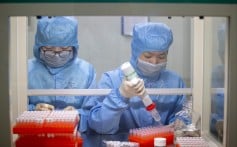Chinese scientists have developed a new gene-editing tool that doesn’t use CRISPR
A team of scientists in Beijing say they have developed a new gene-editing tool that is more efficient than CRISPR technology, as the threat of US export restrictions looms over China’s biotech sector.
The researchers at the Chinese Academy of Sciences Institute of Genetics and Developmental Biology reported their modular gene-editing system – called CyDENT – in the journal Nature Biotechnology on August 28.
It works a little differently to CRISPR/Cas9, which is patented in the United States. That gene-editing tool splits double-strand DNA in order to make edits to the base pairs that make up the strands, according to CRISPR Therapeutics. The DNA is cut and then repaired by a natural cell process, meaning it could lead to imprecise editing and even undesirable mutations.
But CyDENT can be used to perform strand-specific gene editing without any cuts, according to the paper.
Kevin Zhao, one of the study’s authors and co-founder of Suzhou-based Qi Biodesign, said CyDENT used modules to perform different parts of the editing process. The design allows researchers to “find the best bespoke application” for the variations that emerge.
CRISPR/Cas9: a gene-editing tool with promise and peril
CRISPR-based systems rely on a guide RNA to work, which is not a problem when editing the DNA in a cell’s nucleus, according to Zhao. But he said it was a challenge when editing the DNA in a human mitochondria or a plant’s chloroplast because getting the guide in was difficult. Both are nucleic acids in living cells, but RNA is single-stranded while DNA is double.
Zhao said that was why CyDENT was developed using a “protein-based approach” that relies on a protein signal to transport the editor inside, bypassing the need for a guide RNA and allowing access to these hard-to-reach cell genomes.
Within the mitochondria, or the powerhouse of a cell, many single-nucleotide variations have been found that are believed to be associated with disease. These could be therapeutically addressed with “precise base conversion” using a single-strand editor like CyDENT, according to the paper.
DAILY, MONDAY TO FRIDAY
China at a Glance Newsletter
Your daily must-read of essential stories from China, including politics, economy and current affairs.
By submitting, you consent to receiving marketing emails from SCMP. If you don't want these, tick here
As for the chloroplast, where photosynthesis occurs, Zhao said many proteins encoded within its genome were related to the efficiency of converting sunlight to energy – so engineering crops for better energy conversion could produce better yields.
CyDENT’s precision – which comes from its ability to selectively edit one strand of DNA at a time – could allow for more controllable and efficient research into these cell genomes, according to the paper.
It comes as China’s biotech sector is bracing for potential US restrictions. Alan Estevez, the US undersecretary of commerce for industry and security, told the Centre for a New American Security in October that biotechnology was an area where export controls could be applied.
He said that allowing a “US person” to aid China in developing technology that “they’re going to use against us” was the ultimate concern.
In March, three units of Chinese genome research firm BGI Group were added to a US “entity list” restricting their access to American technology on human rights grounds, with the Commerce Department saying they could potentially contribute to surveillance.
President Joe Biden also signed an executive order that month to “advance biotechnology and biomanufacturing innovation” – which China’s cabinet has also identified as a field it wants to bolster.
Congresswoman Stephanie Bice, who is on a national security commission for biotechnology, had earlier said the US needed to be prepared “especially as countries like China continue to integrate biotech into their strategic development”.
Beijing bets on biotech to boost China’s foreign investment inflows
If biotechnology does become a focus for US sanctions, it could have an impact on the development of tools like CyDENT since it does partly rely on imports.
But according to Zhao, while certain products might not be available yet there has been a lot of lab product development in China. He said the nation was “definitely trying to build out its biotech potential, especially starting at what is needed in research”.
For CyDENT – which does not rely on independent intellectual property – the team said further research was still needed to determine the best combinations of its modular elements to yield the best editing results.
Zhao noted that there was still more investigation to be done – and that for human therapeutics, the most important considerations were safety and efficiency – but said the tool had shown great potential for exploring previously un-editable DNA.
He added that the team was “excited to start exploring” what they could achieve in plant chloroplasts, where the editing efficiency does not need to be as high to start more in-depth research.


